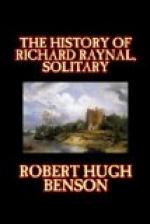“Written at Westminster, the Wednesday after Corpus Xti.
“Yours,
“.......”
I asked the fellow who brought the letter whether he could tell me any more, but all that he could say was that he was in the court outside my lord cardinal’s privy stairs—where the people were assembled to see Master Richard come out, and that he had seen a confusion, and blows struck, and the glaivemen run in to help him. Then he had seen no more, but he thought Master Richard had been taken back again to the palace, and heard that he had been sore wounded and beaten, and was not like to live.
* * * * *
I will not tell you, my children, of my ride to London that night, save that I do not think I ceased praying from the instant that I set out to the instant when I came up as the dawn began behind Lambeth House, and we went over in the ferry. I cried in my heart with David, Fili mi, Fili mi; quis mihi tribuat ut ego moriar pro te, fili mi, fili mi? ["My son, my son! Who would grant that I might die for thee, my son, my son?”—2 Kings xviii. 33.] And I prayed two things—that God might forgive me for having allowed the lad to go, and that I might find him alive. More than that I dared not pray, and I know not even now if I should have prayed the first.
It was a wonderful dawn that I saw as I crossed over, with a mist coming up from the water as a promise of great heat, and above it the high roofs and towers like the lovely city of God, and over all the sky was of a golden colour with lines of pearl across it. It comforted me a little that I should come to Master Richard so.
Even at that hour there were many awake. There was one great fellow by the ferry, that was looking across towards the palace; and I think it must have been he who had taken Master Richard over for love of saint Giles and saint Denis, but I did not know that part of the tale at that time, and I never saw him again.
In the court and passages, too, that we went along there were persons going to and fro. One told me afterwards that never had he seen such a movement at that hour since the night that the King’s mother died. They were all waiting for tidings of the lad, and they eyed me very narrowly, and I heard my name run before me as I went.
At the last we came to a great door, and we were let through, and I was in the King’s bed-chamber.
It was a quiet room, and I will describe it to you now, although I saw little of it at that time.
* * * * *
In the centre, with its head against the wall, stood a tall bed, with a canopy over it, and four posts of twisted wood, carved very cunningly with little shields that bore the instruments of our Saviour’s passion. On the tapestry beneath the canopy, above the pillow, were the arms of the King, wrought in blue and red and gold. The hangings on the walls were all of a dark blue, wrought with devices of all kinds, and they were hanged from a ledge of wood beneath the ceiling such as I have never seen before or since. The ceiling was of painted wood, divided into deep squares, and in the centre of each was a coat. The floor was all over rushes, the cleanest and the most fragrant that I have ever smelled. I think that there must have been herbs and bay leaves mixed with them.




